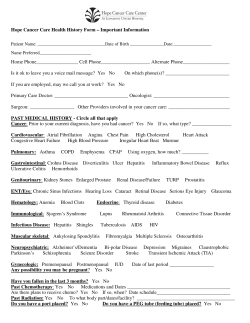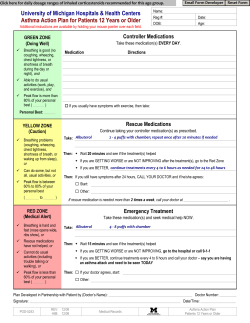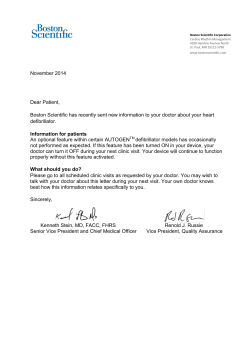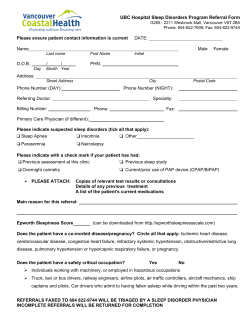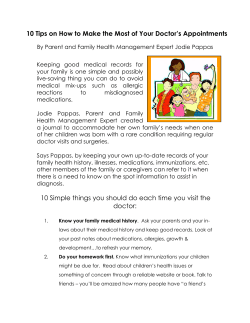
Tips for Healthy Traveling - Cultural Tour Consultants
CULTURAL TOUR C O N S U L T A N T S It Starts With An Idea. . . 259 East Michigan Avenue, Suite 206A Kalamazoo, Michigan 49007 U.S.A. Telephone: (269) 343-5667 (866) 499-3799 – toll free Facsimile: (269) 432-0505 Email: info@culturaltourconsultants.com www.culturaltourconsultants.com Tips for Healthy Traveling Increasing numbers of active adults are enjoying travel. Remaining healthy during your trip is paramount to your enjoyment. Here are some helpful tips. Many people encounter health challenges when they fly or travel by automobile. Longer flights and long car trips increase risk factors. Stop for a stretch break whenever possible. Drink Water Before and during your flight drink plenty of water. Water hydrates the body hence alleviating symptoms of dehydration. Moisture to the nose, eyes, throat and mouth are all maintained through adequate hydration. The process of maintaining pressurized airplane cabins is focused on maintaining enough oxygen – not on enough humidity. Airplane air is very dry and keeping yourself hydrated prevents added stress on your body. Avoid carbonated drinks, tea and coffee as they are all diuretic in nature. Wear Loose Clothing Wearing clothing with an adjustable or expandable waistline, and comfortable footwear. Sitting for long periods of time causes swelling. The same applies to road travel. Restrictive clothing interferes with circulation, digestion and elimination. Avoid Alcohol and Caffeine In addition to the diuretic effect of these beverages, these drinks result in disruption of sleeping patterns. Choose Flight Times Wisely By choosing your flight time wisely, you can suffer much less from jet lag. It may seem like you ‘wasted’ a whole day traveling – but better that than wasting a day recuperating from lost sleep. The best thing to do is to stay up and go to bed at the normal bed time at your destination. Minimize jet lag by getting plenty of sleep before you go. Reduce alcohol consumption and eat well-balanced meals and do not overeat. Do not eat rich or spicy foods prior to flying. Avoid over-thecounter and prescription sleeping medications as much as possible and consult a doctor, before using them. Get as much exercise as you can on your trip. If you have a stopover – don’t sit –take advantage of the airports long corridors for some exercise. Your vacation can take a year to save for, only a second to ruin. Get enough Sleep Many people do not sleep well in different surroundings. Combined with restless sleep and an active schedule and time zone changes it is easy to become overtired. Do not spoil your vacation by neglecting the importance of adequate rest. Avoid Ear Pain An existing nasal congestion or a cold can increase the intensity of ear pain during flights. Taking a decongestant medication prior to flight can help. Consult your doctor Chewing gum or sucking candy, during take-off and landing can normalize pressure on the ear drum. Swallowing hard can help somewhat. Carry your medications Carrying your medications in carry-on luggage reduces the danger of losing access to them, should your luggage get lost or delayed. Ask your doctor if you need to change the dosage during your trip, and how you should readjust the times you take your medication to deal with time changes. If you have diabetes or epilepsy wear a medical alert bracelet – in case of an emergency. In addition to stating your medical problem, the bracelet needs to be inscribed with your medications and dosages and your doctors contact information. Bring the details of your medications—stored separately from the medications. Avoid getting Blood Clots Contrary to what we may think it is not only people with circulatory problems that can get blood clots in their legs after long flights. The problem is sitting for lengthy periods of time can restrict proper blood flow to your feet and legs. Try to get up and walk from end-to-end of the plane once per hour. Wearing support stockings and stretching calf muscles can help. Drinking enough water is the most important preventative strategy. Special Medical Needs Some individuals who need oxygen therapy for circulatory, heart, or respiratory problems may need to take oxygen before and after or during a flight. Consult your doctor. Airlines may provide you with oxygen for a fee. Due to federal regulations you cannot carry oxygen onto a plane. If you require oxygen, you need to make arrangements to have access to oxygen at your travel destination. Prearrange special meal requirements prior to leaving and if you need assistance such as wheel chairs, ensure your ticket is clearly marked. Get your Exercise Exercise prevents blood clots, help prevent swelling which may lead to muscle and joint pain. Doing leg extensions, or standing and raising up onto your tip toes and coming down slowly, exercises the calf muscles. Even gentle exercise helps keep your body working more normally, than remaining in sitting position for countless hours. Eating and Drinking Abroad Use caution about what you are eating abroad. Do not eat rare meats – especially ground meats, steak tartar, raw fish (such as sushi), unpasteurized milk or milk products. Bottled water is available most places and purchasing it is the best way to prevent exposure to water that could cause “tourist diarrhea”. Avoid food sold by street vendors. Always wash your hands with soap and water before you eat and every time you use a washroom. Practice washroom hygienic practices. Vaccines Four to six weeks before your trip visit your doctor and a travel health clinic to determine necessary vaccinations and regional health risks for the destinations on your itinerary. Vaccines are not required for US citizens visiting countries with the European Union. Be Sun-Wise Avoid exposure to the sun. Use SP15 sunscreen is recommended. Stay out of the sun during the peak sun-burning hours to reduce exposure to excessive sun. Be careful about exposure to extreme heat and sun can also prevent heat or sun-stroke. Traveling from cooler climates to extremely hot climates requires time for the body to adjust to the difference in temperature. Swim only in areas designated as safe. Check your Travel Insurance Coverage Travelers are advised to check out travel insurance and read the fine print before buying. Carefully consider what is included or not included and chose the insurance product wisely. Emergency medical care can be extremely costly. New guide available for food-allergic travelers Let’s Eat Out! Allergy Free Passport and a number of cuisine specific allergy avoidance books addresses seven popular cuisines: American, Chinese, French, Indian, Italian, Mexican and Thai, and gives people the tools to enjoy each cuisine anywhere in the world while avoiding 10 of the most prevalent allergens – gluten, peanuts, soy, eggs, dairy, wheat, nuts, corn, fish and shellfish. These books by Kim Koeller and Robert La France are available online through Amazon. Avoid Back Pain Airplane seats are not known for their healthy ergonomic attributes. Travelling light, using a suitcase with wheels and a pull-up handle that allows you to stand upright while pulling the suitcase is the first step in back care. Avoid carrying heavy shoulder bags, including large overloaded purses, or lap top computers. Most rolling suitcases have a clip that allows you to attach any carry-on bags, computers or similar items by attaching them to the suitcase. When you must lift, use proper lifting posture. Avoid twisted, stretching postures when removing items of moving carousels. Squat and use your legs, not your back muscles when lifting.
© Copyright 2025

